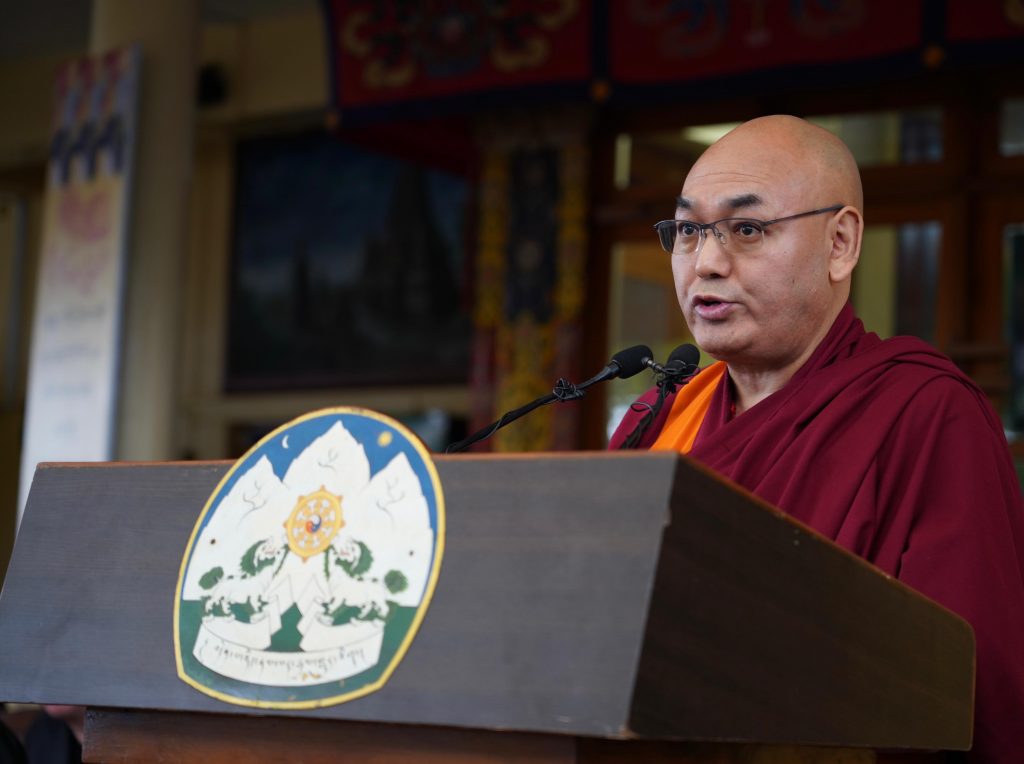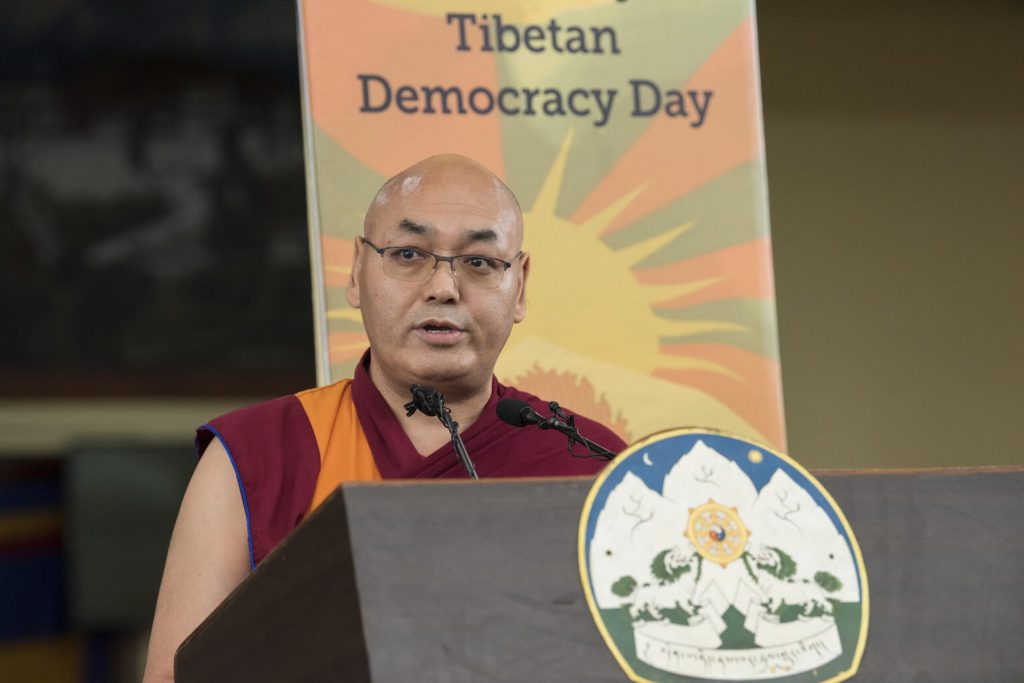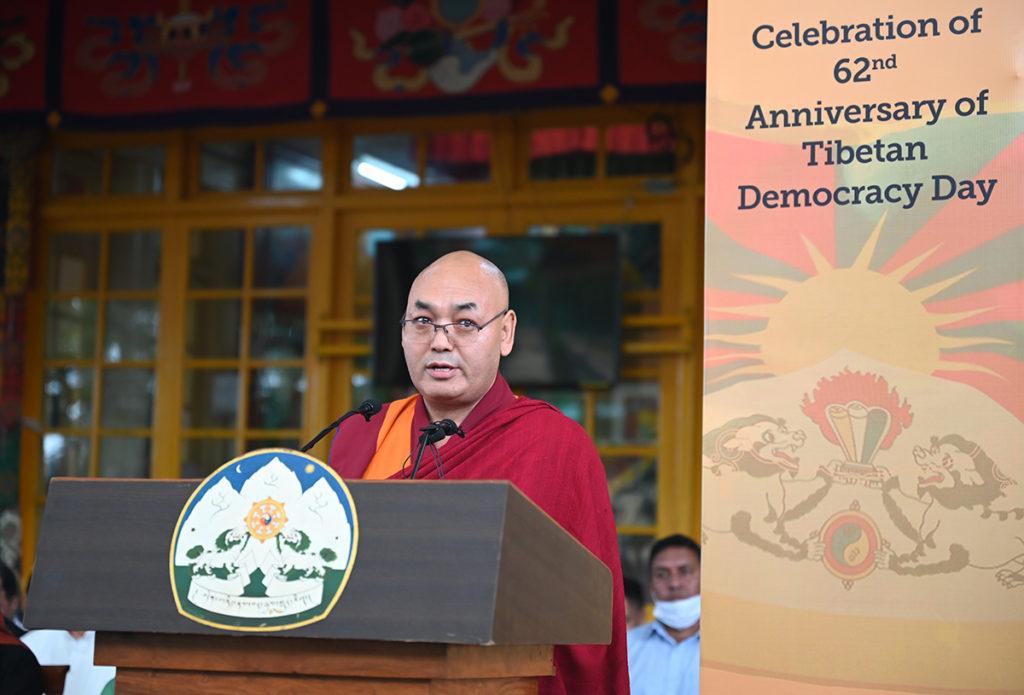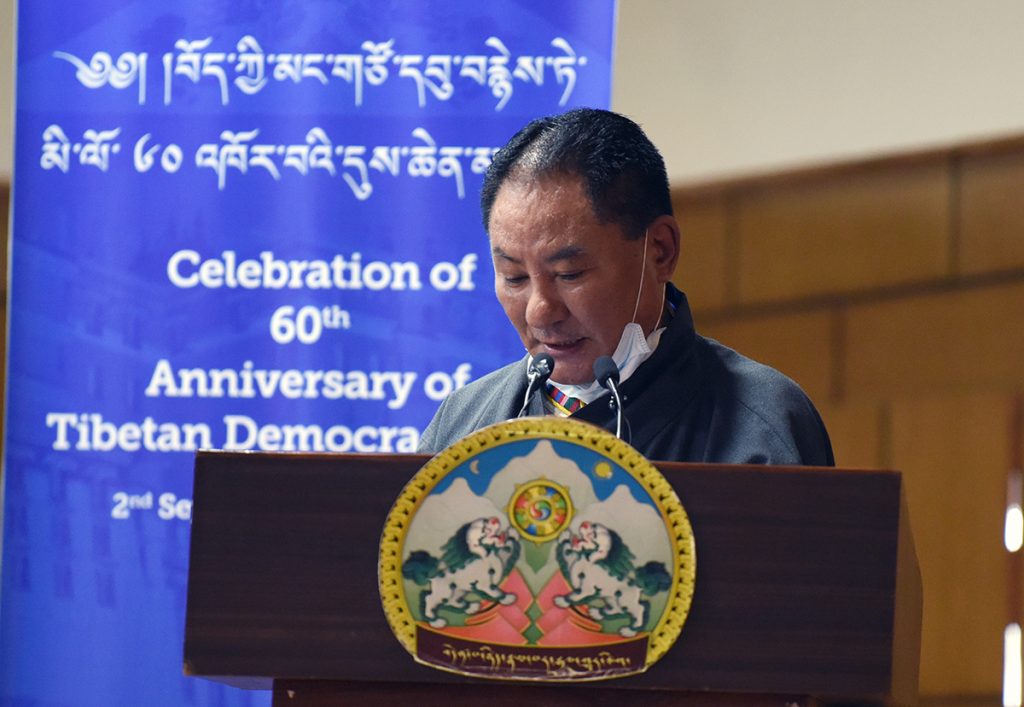Today is 2 September 2016, the outstanding day on which we commemorate the 56th anniversary of the establishment of the noble Tibetan democratic system which incorporates the best of religious and political ethos. On this occasion, I, on behalf of the Tibetan Parliament-in-Exile, offer my greetings and good wishes to my beloved fellow-Tibetans both in Tibet and in exile.
In 1959, the communist government of China seized by use of military force the entire territory of Tibet and imposed its occupation rule over the Tibetan people. Because of it, His Holiness the Dalai Lama, the supreme temporal and spiritual leader of Tibet, was left with no choice but to escape his homeland and seek refuge in the sacred land of neighbouring India. More than eighty thousand Tibetans were, likewise, forced to flee into exile in the footsteps of His Holiness the Dalai Lama. Immediately on stepping foot on Indian soil, His Holiness the Dalai Lama set out to build from scratch all the institutions of a Tibetan government in exile. Along with it, he began the process of newly establishing a Tibetan Parliament-in-Exile with its members representing all the three traditional provinces of Tibet as well as Tibet’s different religious traditions. And on 2 September 1960, the first members of the Tibetan Parliament-in-Exile formally took their oath of office, heralding the establishment of a noble democratic system of Tibet. In 1961, a document outlining the basic features of a constitution for a future Tibet was announced. And in 1963, a constitution of Tibet was promulgated. In 1991, His Holiness the Dalai Lama fixed the term of the elected parliament, increased the number of its members, and introduced other changes to transform it into a meaningful lawmaking body. In keeping with this development, His Holiness the Dalai Lama, on 28 June 1991, gave his assent to the Charter of Tibetans in Exile which had been discussed and adopted by the 11th Tibetan Parliament-in-Exile. Over the years since then, the Tibetan Parliament-in-Exile has been able to adopt, so far, a total of nearly thirty legislative acts as well as rules and regulations of different lengths of the Central Tibetan Administration. In 2001, a new system was instituted by which the Tibetan people directly elected their Kalon Tripa, the executive head of the Central Tibetan Administration. This was a big step forward in the exile Tibetan people’s progress towards democratic development. In particular, in 2011, His Holiness the Dalai Lama, by especially keeping in mind both the immediate and long term interests of the Tibetan people, and after appraising the numerous pros and cons and the reasons underlying them, devolved all his historical political and administrative powers to the leaders elected by the Tibetan people themselves. And His Holiness agreed to be a symbolic representation of the aspirations of the Tibetan people living both in Tibet and in exile and resolved to be of effective service to them. And the exile Tibetan democratic institutions have continued to be carried on in as close a conformity as one may imagine with the wishes of His Holiness the Dalai Lama.
As to whether the democratic system of the Tibetans in exile will attain stability and make progress, much will depend on the intellectual maturity, the capability to uphold the greater good of the whole above all else, and the existence of a sense of cooperation within the Tibetan public. It was with this understanding that recently, after they took their oath of office, the members of the 16th Tibetan Parliament-in-Exile were divided into teams and designated to visit all the different places where Tibetans have settled. And the agenda of the teams was to make the Tibetan people understand – and thereby boost their morale – with explanations of His Holiness the Dalai Lama’s enormous, ever flourishing deeds, how truly tragic the situation in Tibet today remains, about the status of the Tibet issue in the context of the global political situation, about the legislative and other parliamentary works of the Tibetan Parliament in-Exile, about the importance for the Tibetan people to maintain and strengthen their internal solidarity, and so on. And the submissions made by the local Tibetan settlements and colonies, their different sections as well as individuals in matters pertaining to their grievances were forwarded to the executive Kashag of the Central Tibetan Administration as the principal organ and the relevant departments and other administrative bodies under it to enable them to provide timely help and resolution or alleviation of problems. This method of attempts to solve the problems of the Tibetan people remains an ongoing endeavour. Through efforts such as these, the Tibetan Parliament-in-Exile has assumed a position akin to a bridge between the Central Tibetan Administration and the general Tibetan public in its ongoing efforts to fulfil its duties.
One important point bears reiterating this time with regard to the development of the Tibetan democracy in exile. With the recent Tibetan general elections for the elections of the Sikyong and the members of the Tibetan Parliament-in-Exile. Those elections saw fair amounts of incidents of Tibetans forgetting how tragic the situation in Tibet and the people in Tibet had continued to remain and the failure by some to appreciate the importance for the Tibetan people to preserve and adhere to the noble traditions and customs which were supposed to inherent in them without any degeneration. Rather, there were crossing of limits in all areas of the campaigning which was highly adversarial and partisan, imitating the kind of bellicose electioneering which takes place in fully independent, powerful democratic countries of the world. It all led to His Holiness the Dalai Lama, the incomparable leader of the Tibetan people, feeling upset and being seized by a compulsion to speak out. Later, during the ceremony at which the Sikyong took his oath of office, His Holiness said, among other things, “to engage in sectarian partisanship and, likewise, provincial and other kinds of strife based on narrow local interests for the sake of a minor temporary purpose for the present can lead to nothing but what one may call parochial minded selfish gains. This is not at all good. We, the Three Province of Tibet, are one as a people, enjoying our happiness together and, likewise, being as one in moments of sorrow. In other words, we are a community of one people, sharing our moments of joy as well as sorrow in togetherness. We all should strive to ensure that there will never be any communalizing of differences based on such things as provincial bias and I want all of you to keep this in mind.” And later His Holiness the Dalai Lama when speaking to a gathering of Tibetan people in the US state of California, gave this very comforting assurance, “All the discordant issues which cropped up during the recently concluded Tibetan general elections has now completely subsided, like the sky being cleared of all tarnish and the earth of all dust. You can all now be at ease.” As thus spoken by His Holiness, with the elections of the heads of both the executive Kashag and the Tibetan parliament in exile having been concluded, both are now fully immersed in the discharge of their respective duties. All Tibetans must now pool their efforts on the fundamental basis of adhering to an unshakeable bond of fraternity, driven by unequivocal commonality of thought and utterance and through actual deeds, maintaining a singled-pointed chisel like unity. It is therefore time that all the officials of the Central Tibetan Administration and the general Tibetan public work in a cooperative manner to make a positive difference that can result from a unity of purpose.
There is no indication that the government of China may change its policy towards Tibet. In fact, the policy has been becoming ever more repressive and ominous. Let me cite a few examples of the development of such a situation over the past several months. China has been putting out misleading information that by carrying out its plan to build a railway line up to the Tibetan county of Kyirong, which is close to the border with Nepal over the Himalayas, by the year 2020, it intended to link Tibet with the major markets in the Southeast Asian countries and especially India. It also falsely seeks to explain how by establishing a flourishing tourism industry in Kyirong which has beautiful sceneries, the livelihood problems of the local Tibetan people will be solved. However, in reality, the project is seen as being designed to carry out China’s long term expansionist aim that apart from Tibet also poses serious territorial risks to other neighbouring countries such as Nepal and India.
The pieces of land which farmers and nomads across the Tibetan Plateau had owned and freely used as they wished through many successive generations have been taken away by use of force or otherwise partitioned and divided up, resulting in immense livelihood pressure on them. Tibetan nomads who had petitioned to the authorities to seek equitable ownership and division or return of their traditionally owned grassland were not only totally ignored but in addition also subjected to persecution. For example, just recently, a Tibetan Buddhist monk named Soepa was arrested from the gateway of the Sershul County government secretariat after he sought to petition the authorities, asking them for a fair redistribution of land which had illegally been confiscated by force from the local Tibetans. After being taken away by the Chinese police, local government officials told him that the land ultimately belonged to the government, that the Tibetan nomadic community should know that they did not have any ownership right over it. He was also told that if in future Tibetans resorted to petitioning the authorities by refusing to respect decisions of the government of China over land issues, police would be sent to arrest and jail them. Given the situation such as this, it has become extremely difficult for the Tibetan people to sustain their livelihood in their own ancestral land.
Likewise, China had earlier, in the year 2002, carried out a brutal policy on the Serta Larung Ngarig Nangten Lobling in Serta County of Karze Tibetan Autonomous Prefecture, Tibet, imposing a severe reduction in the number of monks and nuns who could study in it, demolishing residences of monks and nuns to be expelled, and carrying out other kinds of repression. And this year China again issued a similar order, saying the religious academy had too many monks and nuns and their numbers needed to be drastically reduced, that the number of residences of monks and nuns was also too high and that many of them therefore needed to be demolished. The order began to be carried out on 20 July and it is still continuing without any care and concern for the sanctity and dignity of the famed Larung Gar Buddhist Academy. This remains a matter of serious concern to us. The government of the United States of America and others as well as various other major forums have paid attention to this development and also expressed serious concerns. The monks and nuns of the Larung Gar Buddhist Academy have been devoted solely to studying Buddhism and its culture and science and to seeking to benefit Buddhism and sentient beings without being involved in any sort of illegal activity. These actions of the government of China clearly expose its hypocrisy on policy towards religious freedom: it routinely claims that there is religious freedom in Tibet. But it clearly expose in reality the restrictions and prohibitions in religious freedom.
Likewise, on 28 July 2016, the government of China distributed to each residence of the monks of Kirti Monastery in Ngaba County a booklet titled “case-based law learning textbook for monasteries” and issued a stern order, saying each monk must intensely study the text. This case-based law learning textbook for monasteries was written in both Tibetan and Chinese languages. Tibetans in Tibet have explained that this is nothing but an attempt by China to give an appearance of legality to its implementation of brutal policies in Tibet which are in violation of international law. The communist government of China has been publishing such misleading documents, making baseless allegations against the Tibetan people, as a cover for its policy of violent repression.
With regard to all aspects of the Tibetan people’s struggle for their fundamental cause, governments across the world, including the United States of America and European countries, parliaments, organizations of various kinds and so on have been continuous in rendering support. In particular, the support from the government and people of India has been especially crucial. Recently, led by the Deputy Speaker, a delegation of members of the Tibetan Parliament in exile called on a number of members of both the Houses of the Indian Parliament during its Monsoon Session in New Delhi. The purpose was to establish rapport, raise awareness about all aspects of the issue of Tibet, and seek support for it. And today, as we commemorate the 56th anniversary of the Tibetan Democracy Day on the Thekchen Choling compound here, we have been joined in our celebrations function by members of the Indian parliament who with giving of speeches and in other manners have extended their support for the issue of Tibet. I take this opportunity to offer my thanks to them all for their having taken interest in the issue of Tibet and for giving support for it.
On the fundamental question of the ways in which the just cause of Tibet should be seen resolved, the cultural and religious heritage of the Tibetan people preserved and carried on, and on other related matters, the main factor remains the zest of the Tibetan people to produce results in all their endeavours at all times in keeping with the wishes of His Holiness the Dalai Lama. We accordingly call on every Tibetan to remain unrelenting and adhere steadfastly to their commitment at all times in persevering to reach their goal. This is a matter of utmost importance.
Finally, we pray that His Holiness the Dalai Lama, the irreplaceable leader of the Tibetan people, live for a hundred aeons, that all his wishes be seen spontaneously fulfilled, and that the just cause of the Tibetan people be realized in all speediness.
The Tibetan Parliament-in-Exile,
Dharamshala
2 September 2016




